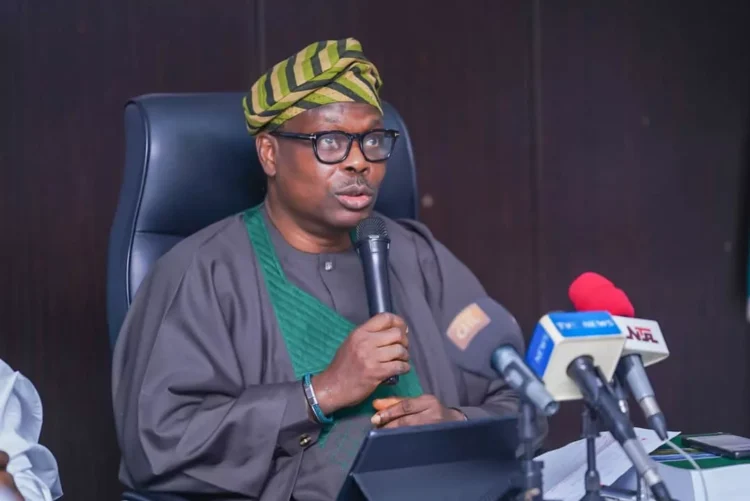The Federal Government has launched the Innovative Cancer Medicine (ICM) Demonstration Study, a programme designed to expand access to advanced cancer immunotherapy for Nigerian patients.
The ICM launched at the National Hospital, on Tuesday in Abuja, is the first in Sub-Saharan Africa and would provide free life-saving cancer treatment to eligible patients battling metastatic colorectal cancer.
ThmomentNG, reports that the programme was in collaboration between the Federal Ministry of Health and Social Welfare, the Clinton Health Access Initiative (CHAI), the Parker Institute for Cancer Immunotherapy (PICI), Bristol Myers Squibb (BMS), and Roche.
Over the next 18 months, 30 Nigerian patients will receive world-class immunotherapy treatment at no cost, including free diagnostics, follow-up care, and patient support.
Speaking at the launch, the Minister of State for Health and Social Welfare, Dr Iziaq Salako, said the initiative demonstrates President Bola Tinubu’s commitment to transforming cancer care in Nigeria and reducing the burden of medical tourism.
“Today’s milestones, the enrolment of the first Nigerian patient, represent hope.
“Hope that patients in low- and middle-income countries, no longer wait decades to benefit from life-saving innovations available elsewhere,” Salako said.
He noted that colorectal cancer has emerged as one of the most aggressive and rapidly increasing cancers in Nigeria, claiming over 5,900 lives annually due to late presentation and lack of access to modern treatment.
“Nigeria records over 124,000 new cancer cases annually, according to the Global Cancer Observatory (GLOBOCAN).
“Cancer treatment remains one of the biggest drivers of medical tourism, with thousands of Nigerians travelling to India, the UK, Germany, and the UAE for expensive care,” he said.
To address this challenge, he said the government announced plans to establish six Regional Cancer Centres, three of which have already been commissioned, while the 2025 federal budget includes the highest-ever allocation to cancer infrastructure.
“Eligibility for the ICM programme is currently open to adult Nigerians diagnosed with metastatic colorectal cancer.
“All assessments and enrolment will take place at the National Hospital, Abuja, and the programme is open to patients nationwide,” he said.
Reaffirming government commitment, Salako said access to cancer treatment should not depend on one’s financial status.
“Cancer treatment should not be a privilege. Every Nigerian deserves access to innovation and survival,” he said.
Prof. Bello Abubakar, the Principal Investigator for the study, hailed the project as a turning point in Africa’s fight against cancer.
“This is the first time this kind of study is being conducted anywhere in Sub-Saharan Africa. For the first time, Nigerian patients can access a modern cancer cure without travelling abroad,” he said.
Abubakar explained that the intervention, valued at about seven billion naira is fully funded by international partners committed to expanding cancer care access in developing countries.
He clarified that the ICM study is not a clinical trial but a demonstration of feasibility, as the drug is already in approved clinical use globally.
“Global health partners at the event commended Nigeria for taking a bold step toward equitable cancer care,” he said.
Dr Funke Fasawe, CHAI Country Director, said the launch shows that groundbreaking medical innovations are now possible within Nigeria’s health system.
“This collaboration proves that advanced cancer treatment can be delivered locally. Every element, from drugs to diagnostics to transportation support, is free for patients. This is not charity; this is justice in global healthcare,” Fasawe said.
Dr Martin Murphy, Co-Founder of the Society for Translational Oncology and a partner in the initiative, described the launch as the dawn of a new era in cancer care on the continent.
Murphy said Africa has long been excluded from access to modern treatment due to high costs and limited infrastructure, but Nigeria is now charting a new path.
Prof. Bello Abubakar, Principal Investigator of the study, said the landmark cancer immunotherapy project aims to close critical gaps in rectal cancer treatment, particularly in understanding patient outcomes and adverse reactions.
He said the study, which would run for one year with a six-month recruitment period, will monitor patients receiving a ₦9.5 million immunotherapy regimen, documenting real-time treatment responses and side effects across sub-Saharan Africa and China.
Abubakar explained that the research seeks to identify why some patients discontinue therapy due to disease progression or adverse events, while also assessing treatment acceptability among patients and healthcare providers.
He noted that the National Hospital, Abuja, can now perform microsatellite instability (MSI) testing using the Roche Ventana platform, describing it as a major step forward for cancer diagnostics in Nigeria.
He said 30 patients with confirmed MSI-high rectal cancer would be enrolled, receiving pembrolizumab free of charge under strict safety protocols.
He emphasised the need to simplify Nigeria’s clinical trial approval processes and ensure sustainable access to immunotherapy medicines, commending the National Hospital, Abuja, and project partners for their support.
Meanwhile, Prof. Abidemi Omonisi, President of the Nigerian Cancer Society (NCS), has expressed concern over the rising incidence of colorectal cancer among young Nigerians, describing the trend as a major public health threat.
Omonisi said the disease, once considered rare in Nigeria, has become the second most common cancer among adolescents, driven by unhealthy lifestyles, poor diets, and late presentation to hospitals.
He stressed the need for early detection, nationwide screening, and stronger public awareness to prevent needless deaths among young people.
He noted that the NCS now operates in all 36 states and 14 countries globally, working with partners to promote research, education, and early diagnosis.









